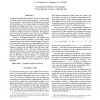Free Online Productivity Tools
i2Speak
i2Symbol
i2OCR
iTex2Img
iWeb2Print
iWeb2Shot
i2Type
iPdf2Split
iPdf2Merge
i2Bopomofo
i2Arabic
i2Style
i2Image
i2PDF
iLatex2Rtf
Sci2ools
ICASSP
2008
IEEE
2008
IEEE
Compressed sensing with sequential observations
Compressed sensing allows perfect recovery of sparse signals (or signals sparse in some basis) using only a small number of measurements. The results in the literature have focused on the asymptotics of how many samples are required and the probability of making an error for a fixed batch of samples. We investigate an alternative scenario where observations are available in sequence and can be stopped as soon as there is reasonable certainty of correct reconstruction. This approach does not require knowing how sparse is the signal, and allows reconstruction using the smallest number of samples. Central to our sequential approach is the stopping rule. For the random Gaussian ensemble we show that a simple stopping rule gives the absolute minimum number of observations required for exact recovery, with probability one. However, for other ensembles like Bernoulli or Fourier, this is no longer true, and the rule is modified to trade off delay in stopping and probability of error. We als...
Related Content
| Added | 30 May 2010 |
| Updated | 30 May 2010 |
| Type | Conference |
| Year | 2008 |
| Where | ICASSP |
| Authors | Dmitry M. Malioutov, Sujay Sanghavi, Alan S. Willsky |
Comments (0)

